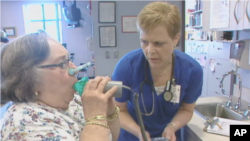Chronic Obstructive Pulmonary Disease, known as COPD, is a life-threatening illness commonly brought on by years of smoking. The World Health Organization estimates that more than 200 million people have been diagnosed with the illness, and that most live in low- and middle-income countries. While it isn't curable, patients' lives can be extended with treatment such as steroids. A new study shows that low doses of the medicine given by mouth are equal to, or better than, a heavy dose administered intravenously.
Meet Dr. Francis Welch, a retired dentist and now a patient diagnosed with Chronic Obstructive Pulmonary Disease. He is paying the price for years of smoking. "I have to think about breathing 60 minutes of every hour. It's a heck of a nuisance," he says.
Because COPD is an ailment that blocks airflow in the lungs, it is critical that COPD patients often focus on breathing, exercise regularly and learn relaxation techniques, especially when they are short of breath.
Chronic Obstructive Pulmonary Disease stems from emphysema and chronic bronchitis, as well as asthmatic bronchitis. Other symptoms include wheezing, a chronic cough producing yellow mucous, and frequent respiratory infections.
The most common cause of COPD is long-term smoking or years of exposure to second-hand smoke.
Miners and workers in chemical industries also are vulnerable because of their exposure to dust, harmful chemicals and fumes.
Doctors say the damage brought on by these conditions eventually interrupts the natural exchange of oxygen and carbon dioxide in the lungs. When those conditions worsen, doctors often treat patients with steroids.
Dr. Peter Lindenauer of Tufts University School of Medicine and his colleagues studied COPD patients treated at 400 hospitals in 2006 and 2007. During hospitalization, patients were treated with steroids either intravenously or by mouth. "The patients in the intravenous therapy group are receiving ten times as high a dose of steroids over the first two days of hospitalization, as compared to patients in the oral therapy group," he says.
In the study, patients who received lower doses of steroids by mouth spent less time in the hospital, and their risk of side effects such as glaucoma, high blood pressure and edema, or swelling in the legs, was reduced.
Dr. Welch stopped smoking more than a decade ago, and he persuaded his son to quit also. "He saw me walking around with a can of liquid oxygen. That got his attention. He finally did smoke, quit smoking, thank God," he says.
The study was published in the Journal of the American Medical Association.
New Study Shows Improved Treatment For COPD Lung Patients










